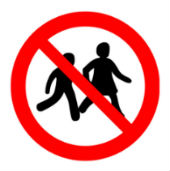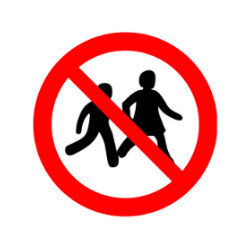 Politicians in the UK plan to force hardcore porn sites to lock out anybody under the age of 18.
Politicians in the UK plan to force hardcore porn sites to lock out anybody under the age of 18.
The UK will elect a new government on 7 May 2015 and the Conservative party say that if they win they’ll compel internet service providers (ISPs) to block sites that don’t provide effective age verification.
Any businesses that don’t comply will get shuttered, according to culture secretary Sajid Javid.
The Guardian quotes him:
If you want to buy a hardcore pornography DVD in a store you need to prove your age to the retailers.
With the shift to online, children can access adult content on websites without restriction, intentionally or otherwise.
As a father to four young children, I worry, like every other parent, how easy it is for them to view explicit material.
That is why we need effective controls online that apply to UK and overseas.
This is about giving children the best start in life; we do not want to prevent adults from accessing legal content but we do want to protect our children from harmful material, so they are free to develop a healthy attitude to sex and relationships.
National Society for the Prevention of Cruelty to Children (NSPCC) chief Peter Wanless told The Guardian that the “easy availability” to children of online pornography, much of it “extreme, violent and profoundly degrading”, is of deepening concern.
It can leave them feeling frightened, confused, depressed or upset. The number of [ChildLine] counselling sessions regarding porn more than doubled last year to over 1,100 with some young girls revealing they were being pressured to mimic scenes from adult films.
Child experts say that easy porn access normalises sexuality, which in turn normalises potentially dangerous sexual behaviour, including sexting.
According to a 2013 poll of 500 children conducted by ChildLine, 60% had been asked for a sexual image or video.
Of those polled, 38% had complied.
Those numbers are a few years old. It’s probably safe to presume that the situation has grown worse.
But even these two-year-old figures point to a plethora of images that can be used for sextortion, cyberbullying or otherwise abusing children.
Susie Hargreaves, chief executive of the Internet Watch Foundation (IWF), said at the time that the poll results came out that the foundation had tracked a “marked rise in self-generated sexual content featuring young people”.
Some of those sexts are intercepted and sold, she said:
A snapshot study conducted by IWF analysts over a 47-hour period found well over 12,000 self-generated images and videos of young people online. Most recently, we see images and videos being gathered together and sold for commercial gain.
Sexting images can also be used by children to cyberbully each other, which, in turn, has resulted in numerous suicides or suicide attempts.
There are yet more associated risks.
From a 2014 Texas State University paper:
Sexting, coupled with teenage sexual experimentation, curiosity, and the sexualization of youth, has presented a new form of risky behavior, resulting in possible legal consequences for youth who engage in such acts (American Psychological Association, 2010; Calvert, 2009; Willard, 2010). Some of these legal interventions have the potential to leave youth branded as (registered) sex offenders. Thus, the consequences of sexting are serious and can negatively affect teenagers for many years after the act has occurred, such as difficulty in attaining future employment, housing, licensing, and educational financial benefits.
Clearly, making it tougher for underaged people to get their hands on explicit, degrading and/or violent porn is a valid goal, as is decreasing the casual sharing of sexual images that can lead to dire results, be it cyber bullying, suicide or a criminal record.
Adolescent brains continue to develop well into the 20s, psychologists have discovered, as the brain gradually gets better at making neural connections necessary to plan ahead, weigh risks and rewards, and make complex decisions.
Even intelligent teenagers act stupid around their friends as they crave the attention and approval of their peers.
Making sexual imagery much less available to children is therefore an understandable goal.
It’s also in keeping with the UK’s ongoing efforts to clean up the online smut cornucopia, from the 2012 Online Safety Bill, stating that ISPs and mobile telcos should provide a porn-free internet connection by default, on up to the more recent push to censor legal but unsavoury content.
Keeping porn away from kids is a worthy goal to aim for, but that doesn’t mean that age verification of explicit porn can actually work.
Facebook’s inability to keep out kids under 13 comes to mind.
In research from 2011, New York University found that 55% of children under the age of 12 had a Facebook account, in spite of Facebook’s age limit of 13.
It’s been estimated that millions of pre-teens log in to Facebook every day.
How do the Tories expect the porn companies to succeed where others, including Facebook, have failed?
Image of no children sign courtesy of Shutterstock.

Tony G
A laudable aim, with quick sound bites for an election campaign. But how it can be implemented seems not to have been thought about. Who will decide what is porn? How will they stop it? Parents may well put filters in place at home, but with kids having smartphones that roam to any wireless access point, this is easily bypassed. Short of all web access devices being only accessible with biometrics, I don’t see how the access can be stopped. All that will then happen is porn will be traded by underage kids on flash memory.
Of course, if we adults were no longer interested in porn, the financial incentives to create it would disappear, and so would the sources.
Mark Stockley
I’m in two minds about this.
In all other areas of security we follow a strategy of defence-in-depth because we accept that every layer is fallible.
If you take the original speech by David Cameron as a guide then this the fourth layer after education for kids, education for adults and ISPs asking customers if they want content filtering so it doesn’t, and shouldn’t, stand on its own.
You can add revenge porn laws to that and, let’s hope, we’ll all be mixing in parental responsibility too.
Since it doesn’t need to catch everything it could work on the same basis that the ICO polices the cookie law – the ICO only respond to complaints but it has a big stick. If somebody complains then the ICO have a clear means to prosecute. So this might just be about creating a deterrent by making the rules crystal clear.
The biggest flaw in this is that it’s already behind the times – as you can infer from the article, people are making their own porn and sharing it (with or without permission) peer to peer.
BoB
These T*****s will promise you a trip to the moon if it will get a vote
Jake
Seems par for the course in election promises, saying “we will do x” without any clues as to how they intend to go about it.
“Effective age verification” is pretty much the same as “accurate identity verification”, which everyone from Facebook to banks have been trying to get right for years with only limited success.
Difference here is, most people are OK with giving copies of important personal documents to their bank, and some seem happy to do the same with Facebook, but who’s going to send a signed scan of their passport or driver’s license to every pron site they happen to stumble into?
Another option would be to have ISPs request age verification on sign-up, but I guess not many teenagers are paying for their own broadband. Or have the person signing up say “I promise no-one underage will ever be using this connection ever”, with general and indiscriminate crippling of their online freedom if they admit to having children, or friends with children who might come visit them, or neighbours whose kids are good at guessing wifi passwords.
There will either be the usual droopy climbdown by the politicos making the promise, or some simple bypass which will mean the ISPs can claim they’re enforcing the rules while no-one in the real world is paying any attention to them.
Martin
Yup will work as good as the other censorship they;ve put in by talking nicely to iSPs. No way of sending in corrections, no audit of whats actually being blocked. Not a good idea
Outside The Marginals
“As a father to four young children, I worry, like every other parent, how easy it is for them to view explicit material.
That is why we need effective controls online that apply to UK and overseas.”
(Sajid Javid quoted in The Guardian)
No, Sajid, it is about responsible parenting not government regulation! You are a Conservative aren’t you?
Canuck
Indeed. Forums across the world are filled with conservatives always going on about personal responsibility and how the state should play no part in people’s lives. Yet with porn, gays, abortion etc – they are extreme nanny-state.
martin
There are products you can buy like netnanny to help with all this.
Chris
It cant work. Unless they plan on having a walled garden which of course would be useless. You only have to believe it will work until after the election.